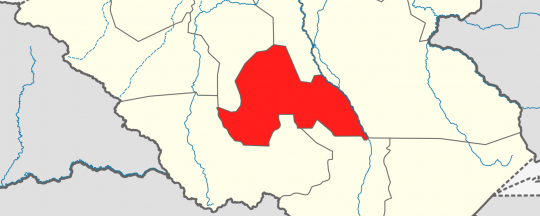The Relief Rehabilitation Commission (RRC), the Center for Emergency and Development (CEDS), the directorate of WASH and sanitation in the State ministry of Infrastructure, Land and Public Utility, and the international and national NGOs Thursday held a quarterly annual review and flood preparedness meeting in Rumbek, Lakes State.
The annual meeting brought together members of the WASH cluster, NGOs, RRC chairperson and the head of specialized committee for infrastructure, land and public utility in the Lakes State legislative assembly.
The Lakes State RRC chairperson, Bub Achiek, told Radio Tamazuj that they listened to the presentations by the NGOs implementing the WASH program, which listed their achievements and pointed out the areas for improvement.
Achiek said that the presentations revealed a concentration of services in some areas, hence the need for the reduction of some programs in areas like Rumbek North, Wulu, and Yirol West.
He said the government policy was to ensure equitable services to the community.
I also called upon the partners to get out of their comfort zones as their sketch map indicated the inequitable construction of the boreholes, he said. Most of the boreholes were concentrated in the more accessible areas.
“I am calling upon all NGOs who are implementing WASH program or other health and educational activities to reach out to the other far areas for equitable distribution of services,” he said.
Achiek also called on all the UN agencies and the international NGOs operating in Lakes State to be prepared for the flooding that could happen any time this year.
The Lakes State Center for Emergency and Development Support (CEDS) head of field office, Abraham Aleu, said the meeting had reviewed all the achievements of the government and the counterparts, and that both parties had learnt a lot from each other.
He said the presentations would help the government to make decisions based on data.
“We have also learned a lot of challenges that are beyond our capacity, and we are going to be turning them into opportunities,” he said.
Further, Aleu noted, there was a good collaboration between the government and the counterparts, with the ultimate goal of delivering services to the people of Rumbek.
We are grateful and we hope our next review meeting will also be as fruitful as we have learnt of our short falls, he said.
Aleu noted the security challenges, mostly in Rumbek North County, where there were community conflicts that derailed most activities. He pointed out that such matters lay in the hands of the state government, and appealed to the authorities to resolve them to allow the delivery of services.
Many of the water sources, Aleu noted, were located along the main roads, where many people from the far-flung areas could not reach easily. “We will be working hand in hand with government to see how we can actually improve on that,” he said.
The Director of Water and Sanitation in Lakes State Barnaba Makuac Magol said all partners had been invited to the quarterly meeting, noting the many milestones, and stating that many challenges remained.
Based on our mission and mandate as the Lakes State government, we urge our community to take ownership of the boreholes while the partners fill the gaps, he said. He pointed out that there was a huge gap and the communities who were not getting services were complaining to the government and the partners. “We must accept the reality. Everybody must participate. The government is participating in mobilizing the partners and donors, so that they address the gaps,” he said.
Magol urged the community to accept to collect tariffs and buy spare parts for the maintenance of their boreholes.
He noted the inadequacy of the India pumps and called for the upgrade of the small water yard system to cater for between 400 to 10,000 people, to serve schools, health centers and villages.
Magol also called for the flood risk awareness in some 10 states. Shambe, Gutthom and Karer in Lakes State were already affected by flooding Magol said, adding that there was a need for mitigation by the government and the partners.
The chairperson of specialized committee of Housing, Land and Infrastructure in Lakes State Mariam Paul Jebi, also noted the achievements and the challenges, especially the sustainability of the boreholes in the villages.
She lamented the reluctance of the communities to take up the ownership of boreholes. “We urge them to take care of their boreholes, to maintain them, and to own them,” she said.
“Another challenge is the gap in the services provision. There are places that are not reached, like Rumbek North, parts of Cueibet and some areas in Aweil County, some areas in Rumbek Central County and Yirol East County.”
“So, there is a need for our partners to sit together with their counterpart, the Ministry of Infrastructure, Land and Public Utility, so that they can work as a team,” she said.
Jebi also noted the gap in the construction of latrines in health facilities, and some schools in Lakes State and said the WASH partners should discuss with the ministry concerned to identify the priority areas.




